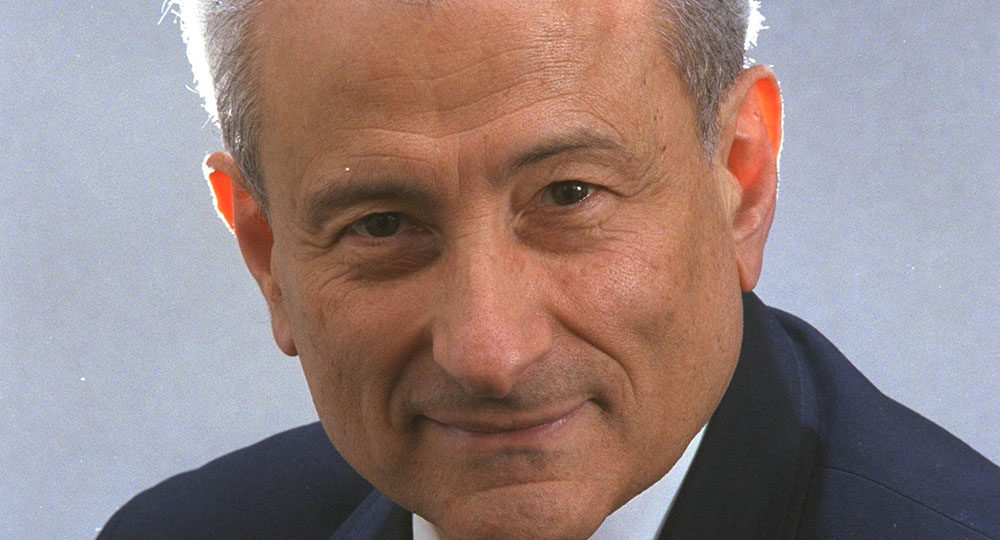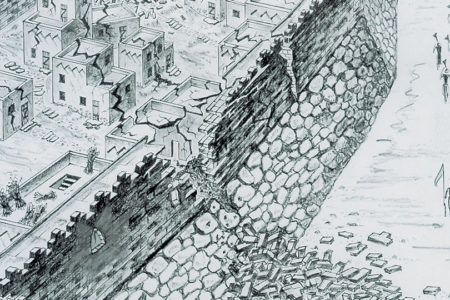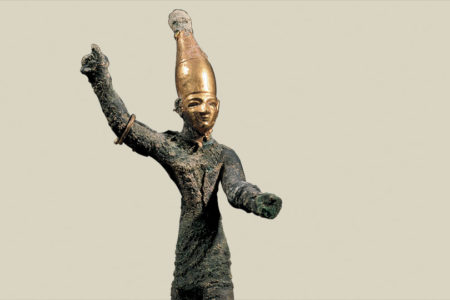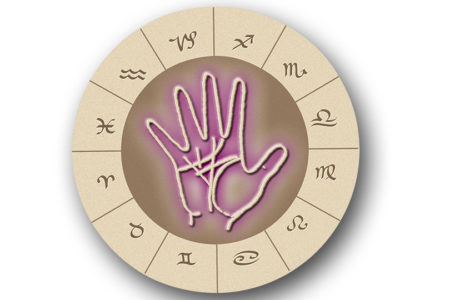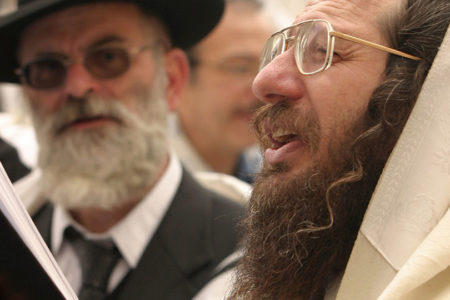Interview With David Bar–Illan
November 18, 1998
Editor’s Note: In view of the turmoil now being experienced in the Middle East, we have decided to replace Israel In The News with an interview Elwood McQuaid conducted with Mr. David Bar-Illan on November 18, 1998. He is the Policy and Planning Director for the administration of Prime Minister Benjamin Netanyahu of Israel. He is also a primary spokesman for the Prime Minister.
EMQ: What are the current aims of the administration related to the peace process?
DB: The Prime Minister has tried to minimize the harm the Oslo Agreement could have inflicted on Israel. The architects of the agreement implied that Israel would withdraw from most of what is known as the West Bank—geographically, Judea and Samaria—and that a Palestinian state would be established in that area. What Benjamin Netanyahu has tried to do, and to date has succeeded in doing, is reduce the area from which we would withdraw. Fortunately, there is nothing in the Oslo Agreement that forces us to leave any specific areas, and it does not dictate the scope of withdrawal. After very lengthy and strenuous negotiations, the Prime Minister managed to reduce withdrawal to 13% of the West Bank, in addition to those areas that were already given up by the previous government. Approximately 80% of the West Bank is still under Israel’s security control, which is, of course, of primary importance to us.
EMQ: The two words that we are hearing consistently from Mr. Netanyahu and yourself are security and reciprocity. You’ve talked about security, but many people do not seem to understand why this insistence in the absolute of reciprocity.
DB: I don’t know if the words mean what they should mean to most people. All the Prime Minister has said is that an agreement by definition is something that both sides are obligated to abide by. Both sides solemnly agree to honor commitments when they make an agreement of this kind. The Palestinians’ original commitments were made five years ago to the late Prime Minister Yitzhak Rabin, who asked precisely for the same things we are asking for now. One is the rejection of the Palestinian Charter, which calls for Israel’s destruction. It is unthinkable that there should be peace with an entity that calls for our destruction. If your negotiating partners don’t feel that you have the right to live there is nothing to discuss! The other demand Rabin made was that they fight terrorism. If we are going to withdraw from areas that are going to be under the control of the Palestinian Authority, we would not want to see them used as launching grounds for attacks and places of refuge for terrorists. The larger the area from which terrorists can move into our population centers and wreak havoc, kill people—men, women, and children—then run away to areas under the protection of the Palestinian Authority, the more critical the situation is for us. Elwood, you know very well how close it is here. We are talking about areas literally across the street from us. We simply cannot allow more death and destruction to befall innocent people.
EMQ: What about the attacks from Hamas, like the two suicide bombings immediately after the Wye Conference? How do they serve to deteriorate the peace process? Are they encouraged by the Palestinian Authority in their intemperate statements to go on with their terrorist activities?
DB: There is no question that intemperate statements by Palestinian leaders encourage terrorism. When you glorify terrorism, when you glorify the terrorists, you cannot expect them to be discouraged. On the contrary, that is precisely the way to make them popular in the street and to create the kind of environment in which terrorism flourishes. The Palestinian Authority has not responded to these bombings by actually condemning Hamas’ activities and dismantling their infrastructure. Quite to the contrary, they are trying to negotiate with Hamas to be quiet for three months, until the Israelis complete the 13% withdrawal we’ve agreed to. This, too, is not exactly an encouraging revelation. If they just want a temporary truce, which would be broken immediately after they receive what they want from us, it would be a major obstacle on the road to peace.
EMQ: This question of continued terrorism casts a shadow over the upcoming “final status” talks, when Arafat is hoping for the Palestinian state he has repeatedly said he will announce on May 4, 1999. There are people here in the West who ask, “What’s the big deal? Why is Israel so uptight over a Palestinian state? Israel has a state; why shouldn’t the Palestinians have one of their own?” Delineate some of the dangers inherent in a Palestinian state that has total sovereignty.
DB: That’s precisely what is at issue. If the Palestinian state is created and remains dedicated to destroying the State of Israel, then we are allowing an entity to become dangerous to us. As I said before, they are right across the street from us. Our country is very small—about the size of New Jersey. It is totally unacceptable to have in our midst a fully sovereign state that can develop a large army and equip it with heavy weapons, tanks, planes, and cannons, not to mention non-conventional arms. A sovereign entity that can make pacts with such regimes as Iraq and Iran, which are avowedly dedicated to the destruction of Israel, must not be allowed to be our neighbor. It is like allowing a fifth column, a Trojan Horse, to grow up among us without any kind of control. Such a state would be able to regulate our water sources and invade our air space. It would be impossible to insure Israel’s survival under such circumstances. So, we want the Palestinian entity to become as independent as possible, as long as it does not threaten our security.
EMQ: What would you envision, short of total sovereignty?
DB: Elwood, I don’t know if people realize that the United States is one of the few countries in the world today that is actually fully sovereign. Even the European states have relinquished some of their sovereignty in order to join the European Union. Another good example is the states within the United States. Obviously, not each state, although it is called a state, is fully sovereign. It yields its sovereignty in many areas to the federal government. So, there are few countries in the world that are really fully sovereign. Some have agreed not; to have an army at all. Others have a limited army, a police force not sufficient to attack other countries. Many countries have strictly limited sovereignty, whether or not they are called states. They don’t have the full type of sovereignty enjoyed by the United States. As long as the Palestinians, by their own admission, are still a hostile force, it would be impossible for Israel to allow the entity to become a fully sovereign state. Having said this, however, we still want them to be able to run their lives with total freedom and have maximum self-rule. As long as they do not endanger our lives, they can function in any way they wish. They already have many of the trappings of a state: their own executive, legislature, and court system, customs system, and their own police force—a force that is really as large as an army. They have their own flag, and they will probably have their own currency soon. There are very few things related to functional state hood that they don’t now have. What we don’t want them to possess is the ability to attack us and endanger our lives.
EMQ: What impact do you think it would have on the peace process if the United States carried through on the decision of the Congress to move its embassy to Jerusalem? Would it make a difference in the peace process? How important is this embassy matter, after all?
DB: It’s extremely important. First of all, it is really quite disconcerting that it hasn’t been done already. Did you know that Israel is the only country in the world that doesn’t seem to be able to designate its own capital. In every other nation, the American Embassy is located in the capital designated by that country. Our capital is Jerusalem. It has not been a capital of any other nation for the past 3,000 years. For the past 3,000 years it has only been the capital of the Jewish people. Even when they did not have sovereignty or control over the area, they considered Jerusalem their only capital. In fact, there is no parallel in history to the attachment between the Jewish people and Jerusalem. From a purely political point of view, it would be advisable to move the American Embassy to Jerusalem. We are never going to give up Jerusalem as our capital. There is practically a wall-to-wall consensus on this in Israel. We are never going to allow the city to be divided. It is going to stay the undivided capital of Israel for all time. The sooner the United States recognizes this as a fact and moves the embassy, the sooner this sore point will disappear. Moreover, as long as the United States does not move the embassy to Jerusalem, the Palestinians will continue to nurse the hope that they will be able to acquire half of the city and make it their own capital, even though it’s never been a Muslim capital, an Arab capital, or anything like that. As long as the United States does not move the embassy, this kind of hope can be nurtured and will remain a source of irritation and conflict. It would be better for everyone concerned for the embassy to be moved and for the facts of life to be made clear, so that we can move on from there with a realistic approach to other problems.
EMQ: It has been my opinion from the beginning, David—and I’d like your comment on this—that moving the embassy would really strengthen and buttress the peace process, rather than detract from it. Is that a fair assessment?
DB: Absolutely. There is no question that it will reinforce what is already a fact on the ground. American recognition of that fact will make it much easier for us to proceed. As long as there is doubt, and as long as there is false hope about the future of Jerusalem, it is difficult to make progress. As soon as that false hope disappears and the facts are recognized by the United States, progress will be possible.
EMQ: Having said that, I have one last question: Where do we go from here?
DB: There are two possible scenarios. If the Palestinians really live up to their obligations, if there is compliance on their part and reciprocity, if they particularly fulfill the commitment to fight terrorism and, in fact, to abolish the covenant that calls for Israel’s destruction, there is a very good chance that we will be able to reach a peaceful arrangement. If, on the other hand, they continue to ignore these obligations or just pretend to discharge them and “make believe” rather than act upon the commitments they have made, the chances for real peace are slim. At this point, I can’t say for sure which scenario is more likely. But of course, living in the Middle East, we are all optimists by nature; otherwise, it would be very difficult to live here. Our first Prime Minister, David Ben Gurion, said, “Anyone who doesn’t believe in miracles in the Middle East is not a realist.”
EMQ: Yes, and with that let me say thank you for being with me and add that we continue to pray for the peace of Jerusalem and to stand by you and your colleagues as you continue to search for peace.
